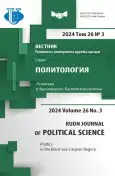Theory and Practice of Geopolitical Design in Modern Romania
- Authors: Azarenkova A.A.1
-
Affiliations:
- Moscow State Linguistic University
- Issue: Vol 26, No 3 (2024): Politics in the Black Sea-Caspian Region
- Pages: 543-555
- Section: GEOPOLITICS OF THE BLACK SEA REGION
- URL: https://journal-vniispk.ru/2313-1438/article/view/322422
- DOI: https://doi.org/10.22363/2313-1438-2024-26-3-543-555
- EDN: https://elibrary.ru/AOPPBK
- ID: 322422
Cite item
Full Text
Abstract
Geopolitical design as a process of developing and implementing political, economic, and military strategies targeted at strengthening the country’s position on the international arena is becoming an increasingly relevant tool for the formation and realization of states’ national interests. The purpose of this study is to identify the geopolitical determination of the foreign policy course of modern Romania. By using the historical method (conceptualization of geopolitical ideas), qualitative content analysis (National Defense Strategy 2020-2024) and discourse analysis, this article examines the theoretical and practical dimension of geopolitical projects, the emergence and development of which is associated with both Euro-Atlantic integration and the positioning of the state as a regional leader in the Eastern Europe. Special attention is paid to the consideration of foreign policy priorities and their reflection in the implementation of geopolitical aspirations. It is concluded that Romania’s desire to strengthen its position in the international arena is realized through integration into existing Euro-Atlantic geopolitical projects and the proposal of its own initiatives, and the idea of Moldova’s accession is still relevant, but has no real prospects in modern conditions.
About the authors
Alina A. Azarenkova
Moscow State Linguistic University
Author for correspondence.
Email: azarenkova_alina99@mail.ru
ORCID iD: 0009-0004-8466-3668
Lecturer at the Department of Political Science
Moscow, Russian FederationReferences
- Bădescu, I. (2011). Tratat de geopolitică. Vol. 1. București: Editura „Mica Valahie”. (In Romanian).
- Belozerov, V.K. (2013). Doctrines and ideologies in the system of political institutions. Vestnik of Moscow State Linguistic University, 24(684), 31–40. (In Russian).
- Belozerov, V.K. (2019). Confrontation of global projects as the main content of modern international relations. In A.Ya. Kasuyk & I.K. Kharichkin (Eds.), Modern Russia in the Global Political process: global and Regional dimension: Proceedings of the International Scientific and Practical conference, Moscow, April 16–18, 2019 (pp. 165–171). Moscow: Moscow State Linguistic University. (In Russian).
- Bitkova, T.G. (2008). Romania and its closest neighbors: Contacts and regional projects. In Yu.I. Igritsky & et al. (Eds.), Eastern Europe in modern Geopolitics: A collection of reviews and abstracts (pp. 129–149). Moscow: Center for Scientific and Information Research on Global and Regional Problems. (In Russian).
- Bitkova, T.G. (2021). Romania and the Balkans: Political, historical, and cultural aspects. Current problems of Europe, (2), 233–252. (In Russian). http://doi.org/10.31249/ape/2021.02.11.
- Bitkova, T.G. (2022). Romania’s interests in South-Eastern Europe and cooperation with Turkey. Analysis and Forecasting. IMEMO Journal, 3, 57–68. (In Russian). http://doi.org/10.20542/afij-2022-3-57-68.
- Conea, I. (1944). O poziție geopolitică. București: Imprimeria Institutului Statistic.
- Dungaciu, D., & Dumitrescu, L. (2019). Romania’s strategic initiatives in the Black Sea area: From subregionalism to peripheral regionalism. Southeast European and Black Sea Studies, 19, 1–19. http://doi.org/10.1080/14683857.2019.1623983.
- Irkhin, A.A., & Moskalenko, O.A. (2021). The Black Sea region in the contest of geopolitical projects of the great powers, 1991–2019. Vestnik RUDN. International Relations, 21(3), 498–516. (In Russian). http://doi.org/10.22363/2313-0660-2021-21-3-498-516.
- Jora, O.-D., Neacșu, M.-C., & Teclean, C. (2024). Rolul mecanismelor regionale de cooperare în contextul geopolitic actual. Oputunități și provocări pentru România. București: Institutul European din România.
- Kiselev, S.G. (2022). Main trends in the geopolitical picture of the world. Vestnik of Moscow State Linguistic University. Social Sciences, (3), 24–30. (In Russian). http://doi.org/10.52070/2500-347X_2023_3_852_24.
- Lavrenov, S.Ya. (2022). Moldova is being integrated into the Eastern European “defense belt” of NATO. Observer, (3–4), 22–38. (In Russian). http://doi.org/10.48137/2074–2975_2022_3–4_23.
- Makukhina, Y.M. (2022). Nationalism in Moldova: Historical analysis of the politico-ideological phenomenon and its threat to Russia’s national security. Human Capital, (3), 57–64. (In Russian). http://doi.org/10.25629/HC.2024.03.05.
- Neacșu, M.-C. (2018). Simion Mehedinți și geopolitica românească. București: CD Press.
- Rogina, M.D. (2022). The role and place of the Black Sea region in contemporary world politics. Kazachestvo, 58(1), 55–67. (In Russian).
- Săgeată, R. (2015). Direcţii şi tendinţe în geopolitica românească interbelică. Analele Asociației Profesionale a Geografilor din România, 2, 5–16. (In Romanian).
- Shihelina, L.N. (2023). The role of the Bucharest Nine of the eastern flank of NATO. Nauchno-analiticheskij vestnik IE RAN, 32(2), 7–14. (In Russian). http://doi.org/10.15211/vestnikieran2202371.
- Shpakovskaya, M.A., & Gavrila, A.A. (2021). The main trends of Romania’s participation in cooperation on the Black Sea. Paradigms of history and social development, 23, 46–50. (In Russian).
Supplementary files









